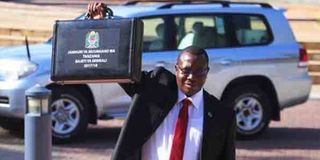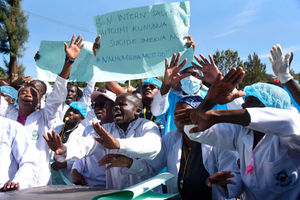Why 2017/18 fiscal year will be tough for TRA

What you need to know:
The taxman collected a total of Sh14.4 trillion during the 2016/17 financial year.
Dar es Salaam. The Tanzania Revenue Authority (TRA) will be under intense pressure in the current financial year as it seeks to collect an amplified amount in tax revenue against a backdrop of missed targets in 2016/17.
The taxman collected a total of Sh14.4 trillion during the 2016/17 financial year.
Much as the money was 7.67 per cent higher than the Sh13.3 trillion which was garnered during the preceding year, it still fell short of the year’s collection target, TRA data show.
A total of Sh15.1 trillion was meant to be collected as tax revenue to partly finance the government’s Sh29.5 trillion-budget for the financial year 2016/17.
With funds from development partners becoming increasingly unpredictable, execution of some development projects suffered.
Presenting a report on the national economic survey for 2016 and the national development plan for the financial year 2017/17 in Parliament in June this year, the minister for Finance and Planning, Dr Phillip Mpango said while the government planned to spend Sh11.8 trillion on development projects in 2016/17, it managed to raise only Sh4.5 trillion as of April 2017 for that purpose. The poor performance, he said was attributed to delays in securing loans and grants due to prolonged negotiations with development partners and commercial institutions.
“Besides, interest rates rose during the period, forcing the government to defer borrowing. The rates of borrowing from international lenders rose to nine per cent from six per cent,” he said.
But against such a backdrop, TRA is now required to collect Sh17.1 trillion, which is Sh2 trillion more than what the taxman was meant to collect during the 2016/17 financial year and Sh2.7 trillion more than what it (TRA) actually achieved during the year. Similarly, development spending is also expected to increase slightly by 1.2 per cent from to Sh11.999 trillion.
This also comes against the backdrop of closure of a total of 7,277 businesses across the country between July 2016 and March 2017 even as the government says that TRA also registered a total of 224,738 businesses during the same period.
Attainable
But economists are of the view that the Sh17.1 trillion-target is practicable, saying the country’s business environment will gradually improve and thus create an enabling environment for the private sector to thrive.
“Had last year’s ways of doing things remained, I would not have been convinced that things would move, but after new measures were introduced in the 2017/18 budget, a lot of things have changed and will continue to change and the Sh17.1 trillion can be realised,” said Prof Humphrey Moshi of the University of Dar es Salaam in a telephone interview yesterday.
Prof Moshi’s arguments are based on a number of measures that the government has taken within the 2017/18 budget aimed at stimulating economic activities.
He is specifically happy with the government’s decision to scrap the annual motor vehicle licence fee and instead raising excise duty on petroleum products by Sh40.
“Before that, one could drive a vehicle with a fake registration sticker and avoid paying the fee, but now, there will be no avoiding the tax. You cannot drive a vehicle without refueling it. So, as you refuel it, you will be paying tax,” he said.
Besides, he said the government has also exempted VAT on importation of capital goods as way of reducing procurement and importation costs on machines and plants used in production. Similarly, it has zero-rate VAT on ancillary transport services associated with goods in transit as it seeks to attract more and more business to the Dar es Salaam Port.
“This was one of the reasons behind a drop a goods at the Dar es Salaam port. This is now bound to change,” he said.
The government, said Prof Moshi, is also determined to pay its various contractors and service providers to public schools, hospitals and security organs, among others.
“All these measures will stimulate economic activities. Besides, people have realised that President John Magufuli wants everyone to work hard and pay tax. You can see how people are complying with payment of Property Tax. I am convinced that the situation will be better this year,” he said.
According to the TRA director of taxpayer services, Mr Richard Kayombo, the tax body is currently undertaking various sensitisation programmes aimed at ensuring that businesses make use of EFDs effectively. Similarly, it hopes to collect more in Corporate Tax, with the deadline for last financial year collections ending on Saturday, July 15.




